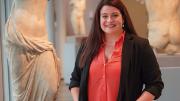Growing up in Costa Rica, Irene Soto Marín once asked her Sunday school teachers the modern-day value of Judas’s bounty for betraying Jesus. Her question—and her other curiosities about the past—launched her career as an economic historian of Roman Egypt. When she was 16, her family moved to New Jersey, and she soon attended nearby Barnard College, majoring in anthropology and ancient studies. There, she joined a summer archaeological dig in Rome. “I was hooked,” she says. “I liked the boring aspects…the slowness of it, the cleaning of the objects.” She later studied in Egypt and continued to visit the country during her doctoral studies of the ancient world at NYU, a postdoc in Switzerland, and a two-year professorship at the University of Michigan. On those Egyptian digs, Soto Marín focused on ceramics, examining whether items were locally made or imported in order to discern ancient trade patterns. She soon became a numismatist (a coin scholar). An assistant professor of ancient history in the classics department, she says that tracking currency circulation shows “how one region of the world traded with another.” She also gleans evidence from paper. In Egypt’s hot, dry environment, reed-based papyrus is well preserved. Using those documents, Soto Marín “get[s] a glimpse into the daily life of regular people.” She’s found that ancient societies can resemble modern ones: “People are still complaining about prices going up or making shopping lists.” When not exploring the ancient world, Soto Marín wanders a digital world. “I love my Nintendo Switch,” she says of the portable gaming device more commonly found in college dorms than professors’ offices. Unsurprisingly, her favorite game—Zelda: Breath of the Wild—features ancient ruins. She’d like to conduct an archaeological dig there, but until that’s possible, she’ll stick to dusting off real-world objects.
Irene Soto Marín
Irene Soto Marín
Ancient history professor studies coins, ceramics, and Zelda.

Irene Soto Marín
Photograph by Stu Rosner
You might also like
Harvard Graduates Can Donate Directly to Their Houses on Housing Day
A new initiative encourages small-dollar donations for improving student life.
Summers Will Retire as Harvard Professor
The former University president is stepping down in the wake of Harvard’s Epstein probe.
Five Questions with Tien Jiang
How brushing and flossing can protect your heart
Most popular
Explore More From Current Issue

What Bonobos Teach Us About Female Power and Cooperation
A Harvard scientist expands our understanding of our closest living relatives.

Inside Harvard’s Most Egalitarian School
The Extension School is open to everyone. Expect to work—hard.

These Harvard Mountaineers Braved Denali’s Wall of Ice
John Graham’s Denali Diary documents a dangerous and historic climb.





